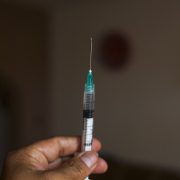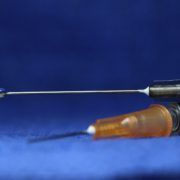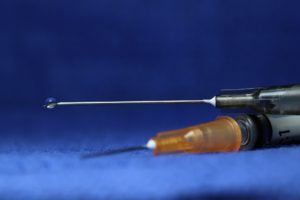Do Cortisone Shots Work on Herniated Discs?
Do Cortisone Shots Work on Herniated Discs?
A recent conversation with someone regarding whether or not they should get a cortisone shot in their back to help a herniated disc inspired me to write this article. Why? Because in speaking with her, I realized how misinformed she was about when you should and shouldn’t get a cortisone shot, and what they are and aren’t good for. And I hate to see people getting procedures or injections when they don’t actually need one.
So when is a cortisone shot a good idea?
Cortisone shots work really well when the primary source of your pain in a targeted area is inflammatory or “chemical”. When you’ve got pain that is of chemical origin – then chemical drugs (like a cortisone shot) will work well to get rid of it. So what is “chemical pain” and how is it different? Chemical pain is the result of your body’s natural inflammatory response in response to injury – which produces an influx of chemicals and other nutrients in your blood to heal the injured area. Since this process creates inflammation and swelling – you feel pain. When the inflammatory process is working correctly, these chemicals naturally dissipate as the tissue heals. But on occasion, the process can get out of hand and get dysfunctional. The painful chemicals linger and create an almost constant state of pain that really doesn’t respond to any kind of movement or even rest. In the case of back pain due to a herniated disc, typically you’ll find that you can relieve it temporarily by changing positions, moving, or going for a walk. But if it’s chemical pain – your back will hurt constantly – it will feel hot and inflamed – and nothing will seem to touch it. While rare, if your herniated disc is causing this type of pain response, then you’ll likely benefit from a cortisone shot. You need to get rid of those chemicals and the cortisone shot will do just that
But most cases of back pain – even those involving a herniated disc – are instead considered “mechanical” in origin.
Mechanical pain is responsible for 70-80% of all musculoskeletal injuries and it has to do with your mobility and movement patterns. Unlike chemical pain – mechanical pain does respond to changes in movement and position. It’s why most people suffering from herniated discs will feel better when they walk, move, or exercise. They can also temporarily relieve their back or leg pain by standing up (for example) after having been sat for a long time. The key recovery tool for mechanical pain is movement – identifying where your mobility restrictions are and where your faulty movement patterns or habits exist. Once you figure this out – the structural component (aka the herniated disc) is irrelevant and you can live with it for years to come without issue. If you’re suffering from back pain or sciatica, and have been told you have a herniated disc, and what I’ve just described is your typical pain pattern – you will likely not benefit from a cortisone shot and instead need a proper movement/mechanical assessment from someone who’s an expert in this sort of thing.
Now here’s where things get confusing…
If you’ve got a herniated disc – it has the ability to irritate the structures surrounding it – everything from muscles to nerves. I’ve seen people aggravate a herniated disc by simply sneezing or coughing. When your herniated disc gets “angry” and irritates the surrounding structures, you will experience localized inflammation. But it’s different from the dysfunctional inflammatory pattern I described previously. It’s still possible to make this inflammation go away on its own – without drugs – because it’s not in a permanent “chemical” state. But when you’ve got a highly sensitive and painful herniated disc it’s very tempting to get a cortisone shot to relieve the pain.
But here’s why I urge you to think twice… The cortisone shot may provide you with temporary relief – but it will be a bandaid.
Because at the end of the day – the cortisone shot will not address the root cause – the underlying mechanical problem that is causing that herniated disc to keep getting angry. What you risk is that during those periods of “pain relief” – you continue to do things that make that herniated disc worse – because you can’t feel what’s going on. If you keep masking the pain pattern with cortisone shots, and keep unknowingly making your herniated disc worse, you may get to the point where you can’t fix it naturally anymore and will be looking at a surgical fix instead.
Ok – so that was a lot of information and scientific terms thrown at you. But at the end of the day – here’s what I want you to remember and think about if you’re considering getting a cortisone shot for your herniated disc…
If you can influence your back pain with any sort of movement or activity – then it’s not the type of pain that warrants a cortisone shot. Cortisone shots do nothing to affect a structure (aka herniated disc) – they only eliminate chemicals that are causing pain. And the short-term pain relief from the cortisone shot will not outweigh the potential long-term and harmful consequences you could experience by not addressing the root cause. But if you’re experiencing the sort of back pain that is hot, inflammatory, and not responsive at all to movement, activity, or positional changes – then you’ve got a situation where a cortisone shot might be beneficial – and could get you over the hump that is needed for movement and activity to actually help.
At the end of the day, before you consider any kind of injection or procedure, be sure you’re well-informed and have asked all the questions necessary to be sure that a natural alternative is not still available and worth trying.
If you are local to Portsmouth, NH – consider speaking to one of my specialists. We will ask you all about what’s been going on and see if we would be the best fit to help you. Click here to request to speak with a specialist.
Dr. Carrie Jose, Physical Therapist and Pilates expert, owns CJ Physical Therapy & Pilates in Portsmouth and writes for Seacoast Media Group. To request a free copy of her guide to back pain CLICK HERE or to get in touch, email her at [email protected].





